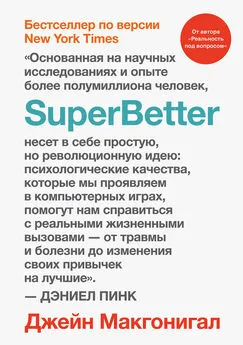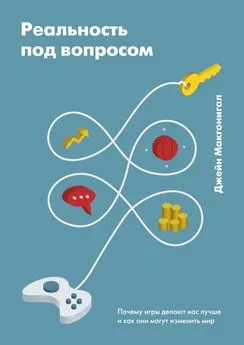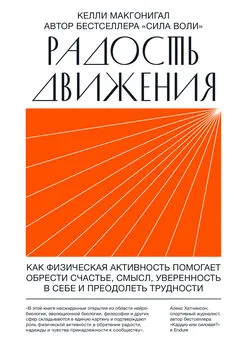Джейн Макгонигал - SuperBetter
- Название:SuperBetter
- Автор:
- Жанр:
- Издательство:Манн, Иванов и Фербер
- Год:2018
- Город:Москва
- ISBN:9785001174301
- Рейтинг:
- Избранное:Добавить в избранное
-
Отзывы:
-
Ваша оценка:
Джейн Макгонигал - SuperBetter краткое содержание
Книга будет интересна всем, кто готов освоить игровой подход для решения повседневных задач.
SuperBetter - читать онлайн бесплатно полную версию (весь текст целиком)
Интервал:
Закладка:
180
Barbara L. Fredrickson . Updated Thinking on Positivity Ratios // American Psychologist. 2013. № 68 (9). P. 814–822.
181
Yoichi Chida, Andrew Steptoe . Positive Psychological Well-Being and Mortality: A Quantitative Review of Prospective Observational Studies // Psychosomatic Medicine. 2008. № 70 (7). P. 741–756; Ryan T. Howell, Margaret L. Kern, Sonja Lyubomirsky. Health Benefits: MetaAnalytically Determining the Impact of Well-Being on Objective Health Outcomes // Health Psychology Review. 2007. № 1 (1). P. 83–136.
182
Ed Diener, Micaela Y. Chan . Happy People Live Longer: Subjective Well-Being Contributes to Health and Longevity // Applied Psychology: Health and Well-Being. 2011. № 3 (1). P. 1–43; Julia K. Boehm, Laura D. Kubzansky . The Heart’s Content: The Association Between Positive Psychological Well-Being and Cardiovascular Health // Psychological Bulletin. 2012. № 138 (4). 655 p.; Sheldon Cohen et al. Positive Emotional Style Predicts Resistance to Illness After Experimental Exposure to Rhinovirus or Influenza A Virus // Psychosomatic Medicine. 2006. № 68 (6). P. 809–815.
183
Bethany E. Kok et al. How Positive Emotions Build Physical Health: Perceived Positive Social Connections Account for the Upward Spiral Between Positive Emotions and Vagal Tone // Psychological Science. 2013. № 24 (7). P. 1123–1132; Bethany E. Kok, Barbara L. Fredrickson . Upward Spirals of the Heart: Autonomic Flexibility, as Indexed by Vagal Tone, Reciprocally and Prospectively Predicts Positive Emotions and Social Connectedness // Biological Psychology. 2010. № 85 (3). P. 432–436.
184
Barbara L. Fredrickson . The Role of Positive Emotions in Positive Psychology: The Broadenand-Build Theory of Positive Emotions // American Psychologist. 2001. № 56 (3). 218 p.
185
Barbara Fredrickson . Positivity: Top-Notch Research Reveals the 3 to 1 Ratio That Will Change Your Life. New York: Random House, 2009.
186
John Mordechai Gottman. What Predicts Divorce?: The Relationship Between Marital Processes and Marital Outcomes. London: Psychology Press, 2014.
187
Robert M. Schwartz et al. Optimal and Normal Affect Balance in Psychotherapy of Major Depression: Evaluation of the Balanced States of Mind Model // Behavioural and Cognitive Psychotherapy. 2002. № 30 (4). P. 439–450.
188
Arménio Rego et al. Optimism Predicting Employees’ Creativity: The Mediating Role of Positive Affect and the Positivity Ratio // European Journal of Work and Organizational Psychology. 2012. № 21 (2). P. 244–270.
189
Amit Shrira et al. The Positivity Ratio and Functioning Under Stress // Stress and Health. 2011. № 27 (4). P. 265–271.
190
Amit Shrira et al. The Positivity Ratio and Functioning Under Stress // Stress and Health. 2011. № 27 (4). P. 265–271.
191
Mara Mather, Laura L. Carstensen . Aging and Motivated Cognition: The Positivity Effect in Attention and Memory // Trends in Cognitive Sciences. 2005. № 9 (10). P. 496–502; Suzanne Meeks et al. Positivity and Well-Being Among Community-Residing Elders and Nursing Home Residents: What Is the Optimal Affect Balance? // Journals of Gerontology Series B: Psychological Sciences and Social Sciences. 2012. № 67 (4). P. 460–467.
192
Ed Diener, Ed Sandvik, William Pavot. Happiness Is the Frequency, Not the Intensity, of Positive Versus Negative Affect // Subjective Well-Being: An Interdisciplinary Perspective. 1991. № 21. P. 119–139.
193
Клинические исследования показали, что рост уровня витамина D ускоряет восстановление мозга. Активированный витамин D представляет собой нейростероид. Он может стимулировать рост новых нейронов и защитить существующие нейроны. Прим. автора.
194
John F. Cryan, Timothy G. Dinan . Mind-Altering Microorganisms: The Impact of the Gut Microbiota on Brain and Behaviour // Nature Reviews Neuroscience. 2012. № 13 (10). P. 701–712.
195
Цифровой детокс — период времени, когда человек сознательно отказывается от смартфонов, компьютеров, планшетов и других цифровых устройств с целью снятия стресса и погружения в реальное общение.
196
Kok, Fredrickson . Upward Spirals of the Heart.
197
Brian M. Curtis, James H. O’Keefe, Jr . Autonomic Tone as a Cardiovascular Risk Factor: The Dangers of Chronic Fight or Flight // Mayo Clinic Proceedings. 2002. № 77 (1).
198
June Gruber et al. Risk for Mania and Positive Emotional Responding: Too Much of a Good Thing? // Emotion. 2008. № 8 (1). 23 p.
199
Adam M. Grant, Barry Schwartz . Too Much of a Good Thing: The Challenge and Opportunity of the Inverted U // Perspectives on Psychological Science. 2011. № 6 (1). P. 61–76.
200
Patricia E. Suess, Stephen W. Porges, Dana J. Plude . Cardiac Vagal Tone and Sustained Attention in School-Age Children // Psychophysiology. 1991. № 31 (1). P. 17–22; Lynn Fainsilber Katz, John M. Gottman . Vagal Tone Protects Children from Marital Conflict // Development and Psychopathology. 1995. № 7 (1). P. 83–92; Bonny Donzella et al. Cortisol and Vagal Tone Responses to Competitive Challenge in Preschoolers: Associations with Temperament // Developmental Psychobiology. 2000. № 37 (4). P. 209–220.
201
Kok, Fredrickson . Upward Spirals of the Heart.
202
Netflix — американская развлекательная компания, поставщик фильмов и сериалов на основе потокового мультимедиа.
203
Xbox — игровая приставка, разработанная и производившаяся компанией Microsoft.
204
Stacey Kennelly . When Guilt Stops Gratitude. Greater Good: The Science of a Meaingful Life. 2014. January 14, http://greatergood.berkeley.edu/article/item/when_guilt_stops_gratitude.
205
Научные консультанты SuperBetter: Джеймс Доти из Стэнфордской медицинской школы, Дачер Келтнер из Научного центра всеобщего блага Калифорнийского университета в Беркли, Келли Макгонигал из Центра исследования и обучения состраданию и альтруизму Стэнфордского университета, Энн Ропке, аспирант по направлению клинической психологии из Пенсильванского университета, Лиза Чаудхари, научный сотрудник Медицинской школы Университета штата Огайо. Также свой вклад внес научный популяризатор Без Максвелл.
206
Todd B. Kashdan, Jonathan Rottenberg . Psychological Flexibility as a Fundamental Aspect of Health // Clinical Psychology Review. 2010. № 30 (7). P. 865–878.
207
Todd B. Kashdan, Jennifer Q. Kane . Post-Traumatic Distress and the Presence of Post-traumatic Growth and Meaning in Life: Experiential Avoidance as a Moderator // Personality and Individual Differences. 2011. № 50 (1). P. 84–89; Holly K. Orcutt, Scott M. Pickett, E. Brooke Pope . Experiential Avoidance and Forgiveness as Mediators in the Relation Between Traumatic Interpersonal Events and Post-traumatic Stress Disorder Symptoms // Journal of Social and Clinical Psychology. 2005. № 24 (7). P. 1003–1029.
208
Steven C. Hayes et al. Acceptance and Commitment Therapy: Model, Processes and Outcomes // Behaviour Research and Therapy. 2006. № 44 (1). P. 1–25; Neharika Chawla, Brian Ostafin . Experiential Avoidance as a Functional Dimensional Approach to Psychopathology: An Empirical Review // Journal of Clinical Psychology. 2007. № 63 (9). P. 871–890; Frank W. Bond, David Bunce . The Role of Acceptance and Job Control in Mental Health, Job Satisfaction, and Work Performance // Journal of Applied Psychology. 2003. № 88 (6). 1057 p.; Jodie Butler, Joseph Ciarrochi . Psychological Acceptance and Quality of Life in the Elderly // Quality of Life Research. 2007. № 16 (4). P. 607–615.
209
Martine Fledderus, Ernst T. Bohlmeijer, Marcel E. Pieterse . Does Experiential Avoidance Mediate the Effects of Maladaptive Coping Styles on Psychopathology and Mental Health? // Behavior Modification. 2010; Todd B. Kashdan et al. Experiential Avoidance as a Generalized Psychological Vulnerability: Comparisons with Coping and Emotion Regulation Strategies // Behaviour Research and Therapy. 2006. № 44 (9). P. 1301–1320.
210
Alexander L. Chapman, Matthew W. Specht, Tony Cellucci . Borderline Personality Disorder and Deliberate Self-Harm: Does Experiential Avoidance Play a Role? // Suicide and Life-Threatening Behavior. 2005. № 35 (4). P. 388–399; Orcutt, Pickett, Pope. Experiential Avoidance and Forgiveness as Mediators in the Relation Between Traumatic Interpersonal Events and Post-traumatic Stress Disorder Symptoms; Neharika Chawla, Brian Ostafin . Experiential Avoidance as a Functional Dimensional Approach to Psychopathology: An Empirical Review // Journal of Clinical Psychology. 2007. № 63 (9). P. 871–890; Todd B. Kashdan, Nexhmedin Morina, Stefan Priebe . Post-Traumatic Stress Disorder, Social Anxiety Disorder, and Depression in Survivors of the Kosovo War: Experiential Avoidance as a Contributor to Distress and Quality of Life // Journal of Anxiety Disorders. 2009. № 23 (2). P. 185–196; Laura E. Boeschen et al. Experiential Avoidance and Post-Traumatic Stress Disorder: A Cognitive Mediational Model of Rape Recovery // Journal of Aggression, Maltreatment and Trauma. 2001. № 4 (2). P. 211–245; Matthew T. Tull, Kim L. Gratz. Further Examination of the Relationship Between Anxiety Sensitivity and Depression: The Mediating Role of Experiential Avoidance and Difficulties Engaging in Goal-Directed Behavior When Distressed // Journal of Anxiety Disorders. 2008. № 22 (2). P. 199–210.
211
Brian L. Thompson, Jennifer Waltz . Mindfulness and Experiential Avoidance as Predictors of Post-traumatic Stress Disorder Avoidance Symptom Severity // Journal of Anxiety Disorders. 2010. № 24 (4). P. 409–415.
Читать дальшеИнтервал:
Закладка:








